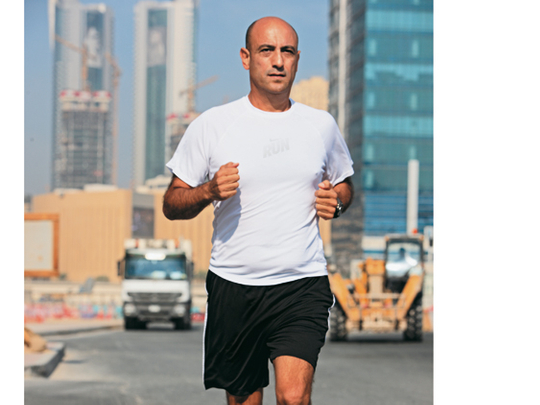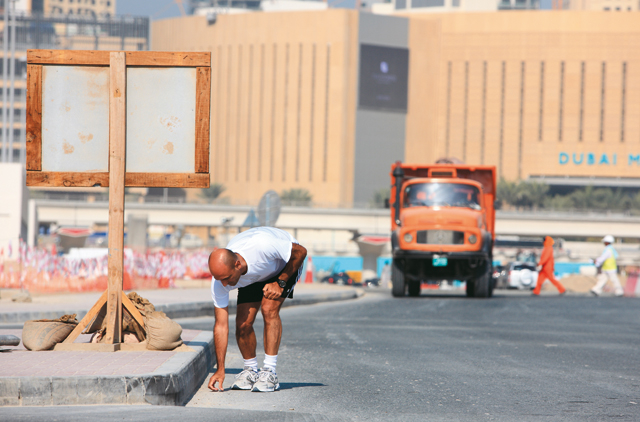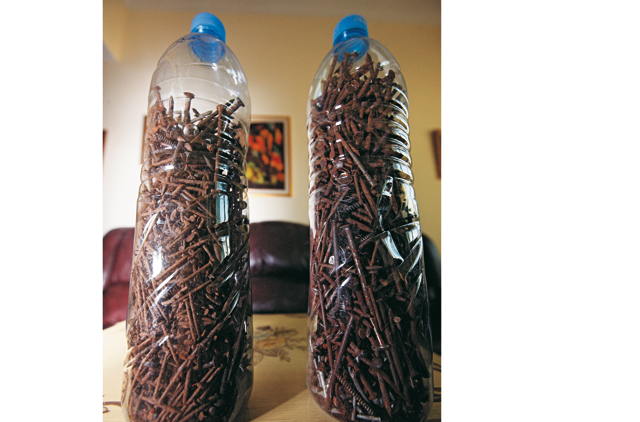
What One man's initiative to pick nails and screws from Dubai's roads
Where Dubai
Who Nabil Hamade, an engineer by profession
Why Small step towards being a socially responsible citizen
To many of us it may look harmless - a rusty old nail lying innocuously on the road. But to Beirut-born Dubai-based engineer Nabil Hamade it is a disaster just waiting to happen. Hamade knows that only too well. He has been at the receiving end more than once and it has taught him some very important lessons. And that is the reason he always stops to pick up any nail lying on the road at any time of the day. He cannot stop himself from picking up nails when he sets off on his morning run and often ends up filling the pockets of his shorts with as many as ten nails by the time he returns home. In fact, one morning not so long ago, he ended up picking 40 nails. And that was during just an hour's run?
But what set him off on the road to picking up nails?
Experience, he says. Experience has taught Hamade that when a tyre hits a nail, it embeds itself in the rubber and could lie dormant for days. But its jagged edges are constantly at work, burying into the tyre deeper and deeper. If luck is on the motorist's side, the nail could still be resting somewhere in the tyre. If your luck runs out, friction, heat and the pressure could give it the final push and the nail will end up rupturing the tyre. The results can only be imagined. "The most dangerous ones are the screws. If a tyre runs over one of them, it's a 100 per cent puncture. With the nails, it's not always so - sometimes you may get a puncture, sometimes not - it depends on where it catches the tyre," says Hamade.
In Hamade's case, it took two punctures in a six-month span to make him keep his eyes peeled for the offending tyre busters on the roads during his morning run. The two times he had a flat tyre after it took in nails, he managed to fix the flat tyre and just make it in time for a scheduled business meeting. Later swapping stories with friends, he discovered it was a common enough story. "I ended up keeping my appointments because I was close to a petrol station and could get help. But both those instances really bothered me," says Hamade.
It set him thinking how dangerous a flat tyre could be on a busy highway.
"What if a tyre ruptures in the middle of a highway and a truck rams into the car from behind? I thought by picking up nails I could prevent one puncture or prevent one accident from taking place. I may even prevent a death or injury. This is besides how much it costs to replace a tyre and the environmental impact of recycling tyres," Hamade points out. While it costs about Dh30 to repair a tyre, replacing an average sized tyre could cost upwards of Dh600.
An electrical engineer by profession, Hamade has calculated that it takes about a quarter barrel crude oil to manufacture a medium-sized car tyre. He estimates that the electricity expended to produce and recycle five tyres could provide power to a one-bedroom apartment for a month.
How do nails end up on the road?
Nails are very often spillovers from construction sites, very often from construction debris being taken away in trucks. Wooden blocks, wood strips pockmarked with nails and broken glass often fall off trucks on which loads are not firmly secured. Hamade's initiative is not about pointing fingers at anyone. His is all about changing what can be altered. Many eco enthusiasts list elaborate plans to save the planet and change the world, Hamade instead focuses on starting small. He hopes to bring about a change to his neighbourhood, while hoping this will be a catalyst for future action.
Once Hamade decided to pick up any nail that he spotted on the road, he realised that he was finding quite a few of them - on the roads near his residence, near his office, by the jogging track.
"I run all the time and I began noticing nails on the roads. After I had those two punctures, I started seeing more and more nails. Somehow they stand out, they come to you," he laughs. "The more I ran, the more I started seeing them. Every day I picked up nails - sometimes three, sometimes 10, sometimes 20. At times I didn't even have room in my pockets to put them."
And for curious readers who wonder if Hamade wears shorts with pockets every time he sets off on a run, the answer is yes. The Lebanese expatriate says the nails have influenced his running gear purchase decisions. "I buy running shorts with pockets now. I have one pair of running shorts without pockets and I have stopped using them. The only time I wear those is when I run at night," he says with a chuckle. At first Hamade used to pick up nails and chuck them behind wooden barriers that line roads on which a construction project is underway. But in June last year he decided to start collecting them.
"I switched from picking nails up and throwing them to the side because there were just too many that I was throwing away. So I started collecting them," he recalls. He now has an unlikely collector's item - two 1.5 litre bottles filled with rusty nails and screws. Hamade plans to hand his stockpile to an artist. "I may give it to an artist to make a sculpture. It can be placed in a park or a place where people can see it," he says. "Maybe I will put a sign on it to make people more aware."
Happy motorists
Erin Hafner, president of the UAE Classic Car & Motorcycle Club, believes educating drivers, their families and workers is crucial to preventing mishaps on the road. Hafner has chalked up six punctures during 12 years of living in the UAE. "It is a high number. Apart from nails, glass pieces and broken bottles also find their way onto the road. When you go off road, broken glass bottles are strewn around and these can damage your tyres."
If you do run over debris or find a nail wedged in your tyre, Hafner's advice is to repair the tyre without delay. He describes nails in a tyre as an accident waiting to happen.
He stresses upon educating people and spreading awareness. "It's all about education. We do have many cleaners on the roads, but people must be more careful themselves. Education against debris is important."
Fiona Newsonsmith, a friend of Hamade's, says colleagues and friends respect how mindful he is of the environment, but can't resist teasing him about his collection. But after she had four tyre punctures last year, she realised there was a point to Hamade's clean-green drive. Her tyres were punctured when her car hit a wooden block peppered with nails on Emirates Road. There was little room to swerve in traffic, she recalls. "It was inconvenient, annoying and it was expensive."
Hamade says every time he sees someone shove a hand out of a car window he worries about what will follow. "I once picked four nails off a piece of wood. People should stop throwing trash out of their cars. That drives me crazy. I've seen that a lot."
Be socially responsible
"The minute I see a hand go out, I think, ‘Oh, what are they throwing out?' Most often it is plastic bottles," he says. "If you throw an apple core you may say it is biodegradable - two weeks later, it's gone, the birds ate it. But I once saw a guy throwing a can of car fuel oil. That is a major pollutant."
Hamade also stumbled on a lead acid battery discarded on the road. "I opened the plastic bag and it was a lead acid battery. Now that I didn't carry, that was too dangerous." He asked security guards to clear it since it was a health hazard.
He hopes his efforts will gradually make a difference. Until a few months ago, construction workers waiting with their mates on street corners stepped aside when they saw Hamade picking nails. He recollects one morning when there were too many nails on the road for his pockets to hold. "I went up to the workers and asked if they would help me. I showed them how, so they picked them up and put them in a heap. There were between 50 and 75 nails."
Now when Hamade runs past the construction site, he finds workers have left piles of nails for him. "It has come a point where they're taking the initiative because they understand the damage nails can cause. They collect and put them on one side. When I come around I put them in my pocket, sometimes I need to take two trips," he says.
A step in the right direction
This slow progress doesn't deter him. "What can a person do to improve things? That is how I like to think. I want people to think that this guy is taking his personal social responsibility to the next level," he says. "We always talk of corporate social responsibility. But when you do something on your own, you are doing it without expecting to be paid for it. What motivates you must come from deep within."
Drivers honk and wave as they whizz past while he is busy collecting rusty nails, and he returns the friendly wave. "The message I want to give is help me pick up less nails by doing your part whether you are a worker, manager or walker. You don't have to collect nails. Just pick up the ones you see and keep them aside so they won't damage a car," Hamade urges.
Scoring runs
He is also a keen marathon runner. Colourful red, blue and green ribbons with participation medals are draped over a photograph of Hamade at his first and toughest endurance challenge - the Dubai marathon last year. He then competed in the Beirut marathon in December last year and recently took part in the Standard Chartered 2010 Dubai marathon.
A chart on his refrigerator door announces his scheduled training run for the month. He runs five times a week and in the lead up to the January marathon he logged 37km on a single day. He jokes about how his nail initiative is eating into these regular runs. "The morning that I collected 40 nails at one go definitely messed up my timing. Sometimes I calculate how many seconds it takes to stop and pick up a nail because it adds on to my time. I go back and pick the nails if they are in really bad areas like in the middle of the street."
Hamade is convinced that responsibility will follow awareness. His hope also rest with the next generation. Hamade's eyes light up when he speaks of his children who live with his ex-wife in the US.
"Kids are taught in school to become aware of recycling, about the impact of CO2. When they come home and see their parents do things wrong, they will not hesitate to say, ‘Hey daddy, you forgot to recycle this.' Kids are more aware now."
In Hamade's mind picking up a nail goes a long way. "It may have prevented a puncture. Also imagine how much energy we save by preventing a new tyre from being made. Sustainability is more than saving the ozone layer. It all adds up - the time and energy you waste while repairing a tyre - and ensures the productivity of society."
His message is clear: take responsibility for something and do it, something you connect to and that will make all the difference.
Do you know of an individual, a group of people, a company or an organisation that is striving to make this world a better place? Every responsible, selfless act, however small or big, makes a difference. Write to Friday and tell us who these people are and what they do. We will bring you their stories in our weekly series, Making A Difference. You can email us at friday@gulfnews.com or to the pages editor at araj@gulfnews.com
Eco enthusiast
Nabil Hamade's core strength is building and managing factories. He has built factories that manufacture chocolate and chemicals in the US and in the UAE. He left Beirut at the age of 18 to study electrical engineering at Wayne State University in Detroit. Upon graduating he stayed in the US for more than 25 years and landed jobs with companies ranging from chemical giant DuPont to leading confectionery company Mars. It was Mars that brought him to Dubai to four years ago to build an extension to an existing facility in Jebel Ali. Dubai also marked the beginning of a new venture - a project close to his heart. He launched energy management consultancy Cstar Energy in 1998. The company carries out energy audits and develops energy-saving plans for local companies in Dubai to reduce pollution. "When I thought of starting my own company I had to think about what it is that I love the most. And I love energy, saving energy, energy management; in a nutshell saving the environment."












